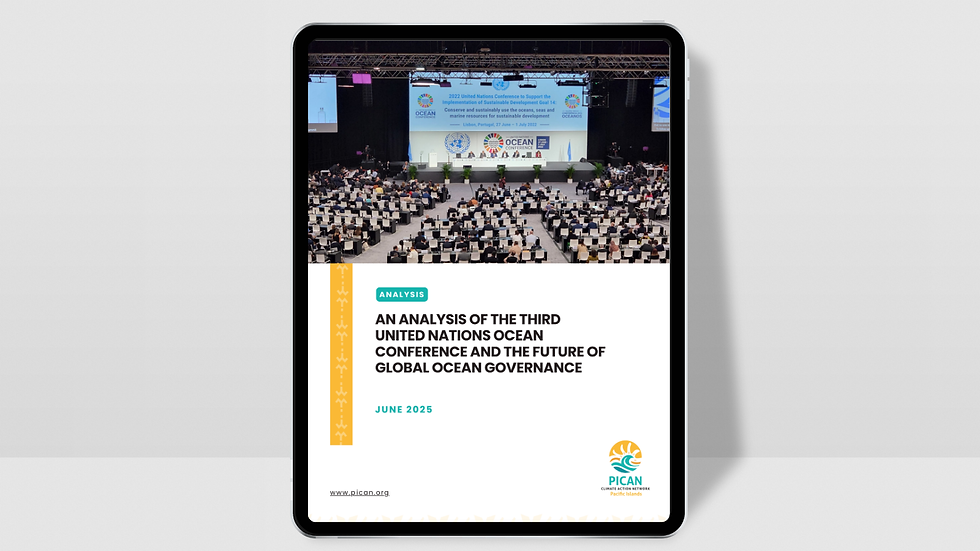UNOC3 Outcome Analysis — The Legacy of Nice
- Pacific Islands Climate Action Network

- Jun 14, 2025
- 2 min read

[NICE, 14 June 2025] — The Third United Nations Ocean Conference (UNOC3) was held in Nice, France from 9–13 June 2025. Co-hosted by France and Costa Rica, this conference aimed to serve as a “Paris Agreement for the Ocean” by accelerating action and mobilizing all stakeholders to conserve and sustainably use the ocean in support of Sustainable Development Goal 14 (Life Below Water). Positioned at the midpoint of the UN Decade of Ocean Science for Sustainable Development (2021–2030), UNOC3 brought together Member States, UN bodies, non-governmental organisations, scientists and private-sector representatives in both formal plenaries and over 450 side events.
PICAN Director, Dr Rufino Varea, was on the ground in Nice providing technical support to the Fiji Government and has distilled the most significant developments and debates. Among the highlights:
Catalyst for Multilateral Treaties
UNOC3 propelled the High Seas Treaty (BBNJ) to within nine ratifications of entry into force, with Pacific Small Island Developing States again leading the charge. Meanwhile, the “Nice Wake-Up Call” on plastics secured a joint declaration by 95 countries, defining ambitious pillars for the upcoming Global Plastics Treaty negotiations.
Momentum vs. Weak Declaration
The Nice Ocean Action Plan’s political declaration acknowledged the massive SDG 14 funding gap, estimated at US $175 billion per year, but omitted any reference to fossil fuels, deep-sea mining moratoriums or the polluter-pays principle. This contrast underscored the conference’s true legacy as a catalyst for targeted coalitions rather than a unified, legally binding agreement.
Pacific Leadership in Action
Acting as a cohesive bloc of “Large Ocean States,” Pacific nations turned vulnerability into strength. Highlights include French Polynesia’s creation of the world’s largest Marine Protected Area, a regional ban on deep-sea mining, and coordinated ratifications of the BBNJ Treaty by Fiji, Solomon Islands, Tuvalu and Vanuatu.
Persistent Finance and Equity Gap
While €1 billion in new public commitments and a proposed “One Ocean Finance” facility marked progress, they fall far short of what SIDS and LDCs need. The formal recognition of SDG 14 as the least funded goal signals political will, but real change demands scaled-up, grant-based finance with direct access for frontline communities.

PICANs analysis of the UNOC3 Outcomes explores the strengths and shortcomings of the political declaration, the landscape of over 2,600 voluntary commitments, thematic battles on deep-sea mining, ocean-climate integration, plastics, and the path forward through critical forums such as the International Seabed Authority, INC-5.2 for plastics, and COP30.
You can also see the daily updates of the UNOC3 that PICAN published to provide our network and members a summary of discussions, key side events and interventions throughout the week. You can access the daily summaries here.
About PICAN
PICAN is a regional alliance of 190+ non-governmental organisations, civil society organisations, social movements and not-for-profit organisations from the Pacific Islands region working on various aspects of climate change, disaster risk and response and sustainable development.
Media Contact:
Dylan Kava, Strategic Engagement and Communications Lead, PICAN
dylan.kava@pican.org | +679 9061989 (Fiji / GMT+12)




Comments